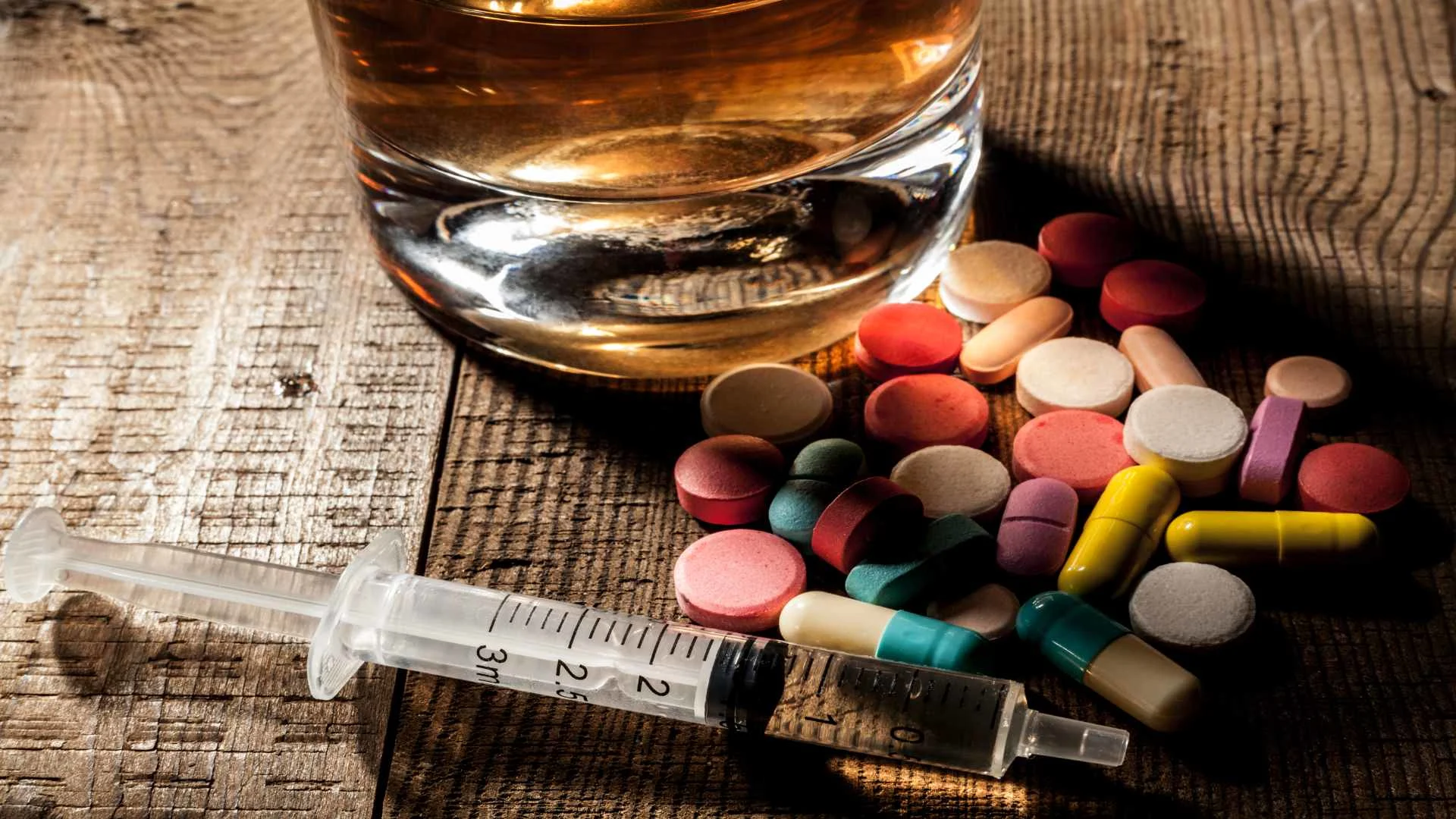Addiction Recovery - Drug and Alcohol - Meditation
Adderall and Alcohol Abuse

Mixing Adderall and alcohol can have dangerous effects on your health. Learn the risks, warning signs, and how to find help for addiction and recovery.
What happens when you mix Adderall and alcohol?
Mixing Adderall, a stimulant, with alcohol, a depressant can mask alcohol’s effects, leading to excessive drinking. This increases the risk of alcohol poisoning, heart problems, and reckless behavior due to impaired judgment, making the combination highly dangerous.
Can mixing Adderall and alcohol lead to addiction?
Yes, using Adderall and alcohol together can increase the likelihood of dependence. Over time, the body builds tolerance, leading to higher consumption of both substances. This can result in addiction, requiring professional treatment to manage withdrawal and recovery safely.
What are the signs of Adderall and alcohol abuse?
Common signs include insomnia, weight loss, and cardiovascular issues. Behavioral changes like neglecting responsibilities, secrecy, and social withdrawal are also indicators. Psychological symptoms such as heightened anxiety, paranoia, and severe mood swings suggest a growing problem that requires professional intervention.
How does long-term use of Adderall and alcohol affect health?
Chronic use can lead to severe cardiovascular issues, memory problems, and increased risk of mental health disorders. The combination strains the heart, damages cognitive function, and raises the likelihood of developing a substance use disorder, making long-term health consequences severe.
What should I do if I or someone I know is abusing Adderall and alcohol?
Seeking professional help is essential. Treatment centers like The Edge Treatment Center provide personalized recovery programs, including detox, therapy, and support groups, to help individuals overcome addiction and achieve lasting sobriety. Early intervention significantly improves the chances of successful recovery.
Mixing Adderall and alcohol is more dangerous than many realize. While Adderall is prescribed to treat ADHD, combining it with alcohol can mask intoxication, leading to risky behaviors, overdose, or long-term health issues.
If you or someone you love is struggling with substance use, it’s essential to understand the risks and seek support. Addiction can feel overwhelming, but recovery is possible with the right help.
At The Edge Treatment Center, we provide compassionate, personalized care to help you break free from substance abuse and build a healthier future. You don’t have to face this alone—help is available.
Understanding Adderall and Alcohol
Adderall and alcohol are two substances that have vastly different effects on the body and brain. While Adderall is a prescription medication used to manage attention-deficit/hyperactivity disorder (ADHD) and narcolepsy, alcohol is a widely consumed substance known for its depressant effects. When combined, these substances can create serious health risks and dangerous behavioral consequences.
What Is Adderall?
Adderall is a central nervous system stimulant that contains amphetamine and dextroamphetamine. It works by increasing dopamine and norepinephrine levels in the brain, enhancing focus, alertness, and energy levels. For individuals with ADHD, Adderall helps improve concentration and impulse control. However, when misused—such as taking higher doses than prescribed or using it without a prescription—it can lead to dependence, cardiovascular issues, and mental health complications like anxiety or paranoia.
What Is Alcohol?
Alcohol, on the other hand, is a central nervous system depressant that slows down brain function. It affects neurotransmitters like gamma-aminobutyric acid (GABA), which induces relaxation, reduces inhibitions, and impairs coordination and judgment. While moderate alcohol consumption may not pose immediate harm, excessive use can lead to addiction, liver damage, and cognitive decline.
How Adderall and Alcohol Affect the Brain and Body Differently
Since Adderall is a stimulant and alcohol is a depressant, their effects on the body oppose each other. Adderall increases heart rate, blood pressure, and alertness, while alcohol slows reaction time, impairs motor skills, and causes drowsiness.
When taken together, Adderall can mask the sedative effects of alcohol, making individuals feel less intoxicated than they are. This often leads to excessive drinking, increasing the risk of alcohol poisoning, blackouts, and dangerous behaviors.
Understanding these differences is crucial in recognizing why mixing Adderall and alcohol is particularly risky. Misusing these substances together not only strains the body but can also lead to serious health complications, including addiction. If you or a loved one is struggling with substance abuse, professional help is available to guide you toward recovery.
What Are the Long-Term Effects of Using Adderall and Alcohol Together?
Regularly combining Adderall and alcohol can have serious long-term effects on both physical and mental health. While the short-term risks include impaired judgment, dehydration, and an increased likelihood of overdose, the long-term consequences can be even more severe, affecting the heart, brain, and overall well-being.
Cardiovascular Issues
Adderall is a stimulant that increases heart rate and blood pressure, while alcohol can cause irregular heart rhythms and weaken heart muscles over time. When used together over an extended period, these substances put excessive strain on the cardiovascular system, increasing the risk of:
High blood pressure (hypertension)
Irregular heartbeat (arrhythmia)
Heart disease
Stroke
Heart failure
Cognitive Impairments
Both Adderall and alcohol affect brain function, and chronic use of both substances can lead to long-term cognitive decline. Adderall overuse can contribute to anxiety, paranoia, and memory problems, while excessive alcohol consumption is linked to brain shrinkage and neurological damage. When combined, they can cause:
Memory loss and difficulty concentrating
Increased risk of mental health disorders such as depression and anxiety
Impaired decision-making and problem-solving abilities
Higher likelihood of developing psychosis or paranoia
Increased Risk of Substance Use Disorders
Using Adderall and alcohol together frequently can lead to dependence on both substances. The body adapts to their presence, leading to higher tolerance levels and an increased risk of addiction. Over time, individuals may find it difficult to function without one or both substances, resulting in:
Physical and psychological dependence
Withdrawal symptoms, such as fatigue, irritability, and depression
Escalation to more dangerous substances or higher doses
Difficulty quitting without professional intervention
The long-term consequences of mixing Adderall and alcohol are serious and can severely impact a person’s quality of life. If you or someone you love is struggling with substance abuse, seeking professional treatment can make a significant difference. Recovery is possible with the proper support, and taking action now can prevent lasting damage to your health and future.

We’re Here To Help You Find Your Way
Would you like more information about adderall and alcohol? Reach out today.
Recognizing the Signs of Adderall and Alcohol Abuse
When Adderall and alcohol are misused together, they can lead to serious health risks and addiction. Identifying the warning signs early can help prevent long-term damage and guide individuals toward seeking help. The symptoms of abuse can be physical, behavioral, and psychological, affecting every aspect of a person’s life.
Physical Symptoms
Chronic misuse of Adderall and alcohol takes a significant toll on the body. Some of the most common physical signs of abuse include:
Insomnia – Difficulty falling or staying asleep, often leading to chronic fatigue.
Weight Loss – Adderall suppresses appetite, and prolonged use can cause malnutrition.
Cardiovascular Issues – Increased heart rate, high blood pressure, and chest pain can develop due to stimulant and alcohol interactions.
Behavioral Signs
Changes in behavior can indicate substance abuse, especially when someone begins prioritizing drug and alcohol use over responsibilities. Watch for:
Neglecting Responsibilities – Declining performance at work or school, missing deadlines, or failing to meet obligations.
Social Withdrawal – Avoiding friends and family, isolating from loved ones, or spending more time with others who misuse substances.
Increased Secrecy – Hiding alcohol or pills, lying about substance use, or becoming defensive when questioned.
Psychological Indicators
Since Adderall affects brain chemistry and alcohol alters mood, frequent misuse can lead to significant mental and emotional changes, such as:
Heightened Anxiety – Increased feelings of worry, panic attacks, and difficulty relaxing.
Mood Swings – Extreme irritability, aggression, or emotional outbursts that seem out of character.
Paranoia – Feeling overly suspicious, fearful, or believing others are out to harm them.
Recognizing these warning signs in yourself or a loved one is the first step toward recovery. If these symptoms sound familiar, professional treatment can provide the support needed to break free from addiction. The sooner help is sought, the greater the chances of achieving a healthier and more fulfilling life.
The Path to Recovery
Recovering from Adderall and alcohol abuse starts with acknowledging the problem and taking steps toward change. Substance abuse can feel overwhelming, but with the proper support, long-term recovery is possible. Seeking professional help can provide the tools and guidance necessary to break free from addiction and regain control of your life.
Acknowledging the Problem and Seeking Help
The first and most crucial step toward recovery is recognizing that substance use has become a problem. It can be difficult to admit when Adderall and alcohol use is negatively affecting your health, relationships, and daily responsibilities. However, seeking help is a sign of strength, not weakness. Reaching out for support can prevent further harm and set the foundation for a healthier future.
Treatment Options for Adderall and Alcohol Abuse
There are several evidence-based treatment options available for those struggling with substance abuse:
Detoxification – Medically supervised detox helps remove substances from the body while managing withdrawal symptoms safely. Since quitting Adderall and alcohol suddenly can cause serious side effects, professional detox is often recommended.
Therapy – Behavioral therapies, such as Cognitive Behavioral Therapy (CBT), help individuals identify triggers, develop coping strategies, and address underlying mental health conditions.
Support Groups – Programs like Alcoholics Anonymous (AA) or SMART Recovery provide a community of people who understand the challenges of addiction and offer encouragement.
Personalized Treatment Plans for Lasting Recovery
Every individual’s journey to recovery is different, which is why a one-size-fits-all approach doesn’t work. Personalized treatment plans are essential in addressing specific needs, whether it’s co-occurring mental health disorders, trauma, or lifestyle factors that contribute to substance use. A tailored plan may include a combination of therapy, medication management, holistic treatments, and aftercare programs to ensure long-term success.
The Benefits of Professional Support
Trying to overcome addiction alone can be challenging and, in some cases, dangerous. Professional treatment centers provide a structured, supportive environment where individuals can heal physically, emotionally, and mentally. The benefits of professional support include:
Access to medical professionals who can manage withdrawal symptoms safely.
A structured plan designed to prevent relapse and promote long-term recovery.
A strong support system of counselors, peers, and mentors who guide individuals through each stage of healing.
Recovery is a journey, but you don’t have to take it alone. Seeking help from a dedicated treatment center can provide the foundation for a new beginning, free from the cycle of addiction. If you or a loved one is struggling, reaching out for professional support could be the most essential step toward a healthier, brighter future.

We’ll Lead You to New Heights
Do you have more questions about adderall and alcohol? Reach out.
Adderall and Alcohol Abuse Controlling Your Life? We Can Help
Mixing Adderall and alcohol can have dangerous consequences, from serious health risks to addiction. If you or a loved one is struggling with substance abuse, it’s essential to seek help before the damage becomes irreversible. Recovery may seem challenging, but you don’t have to go through it alone.
At The Edge Treatment Center, we provide compassionate, personalized treatment to help individuals break free from addiction and rebuild their lives. A healthier future is possible, and we’re here to guide you every step of the way. Contact us today to start your journey toward lasting recovery.

We’re Here To Help You Find Your Way
If you or a loved one is struggling with addiction, there is hope. Our team can guide you on your journey to recovery. Call us today.
Written by
The Edge Treatment Center
Reviewed by
 Jeremy Arzt
Jeremy ArztChief Clinical Officer
Addiction Recovery
Drug and Alcohol
Meditation
March 14, 2025
